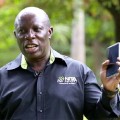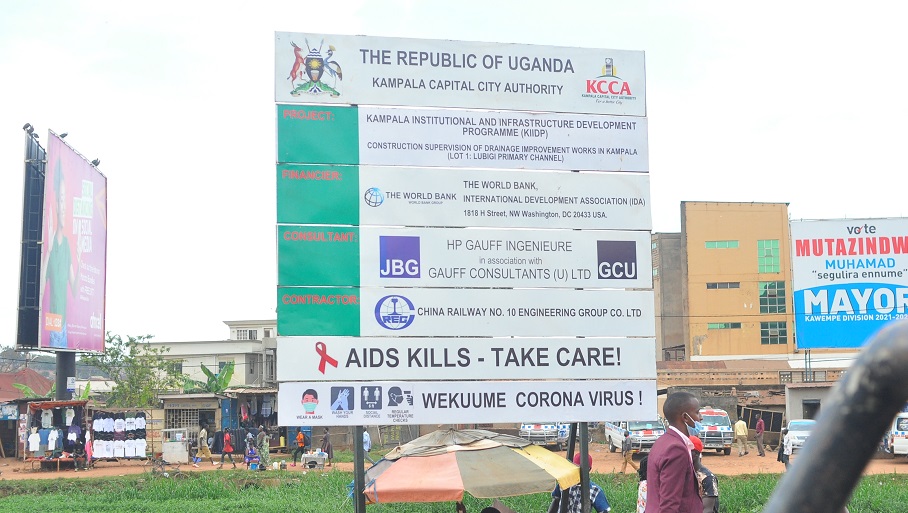WITNESS RADIO MILESTONES
How officials looted Shs158 billion from Land Fund
Published
8 years agoon

Probe. Justice Catherine Bamugemereire (left), the head of the Commission of Inquiry into Land Matters, and other members of the commission, listen to an official from the Nakaseke District land office at a public hearing in Nabbika Village, Nakaseke District, recently. PHOTO BY DAN WANDERA
A potentially mega corruption scandal worth more than Shs158b threatens to shatter the country’s record of stealing public resources in a single scheme involving a web of government officials, lawyers and other private citizens.
The network is suspected to have carefully hatched and fuelled the ripping-off of public money from the “land fund” with impunity for at least 15 years.
It is a story that begins with the failure by government officials to establish proper procedures to run the Land Fund and ends with the same officials working with a carefully selected team with access to power to dig their fingers deeper into the government purse.
The tale of mega theft also involves the same team, using insider information, manipulating would-be or intended beneficiaries with paltry pay-offs and or forged documents.
To date, the Land Fund established under Section 41 of the Land Act as a “multi-purpose resource envelope meant to serve targeted beneficiaries, including tenants seeking to buy or own land, government seeking to buy land for redistribution to bonafide occupants or resettlement of the landless, among others” has never been operationalised but some government officials working with the “network” are using funds for the “support Uganda Land Commission” project to enrich themselves through shady reimbursements.
Through this and other avenues, taxpayer money has been channeled out ostensibly as compensation to absentee landlords in former lost counties of Buyaga and Bugangaizi in present day Kibaale District in Bunyoro. In 2002, government set up a land fund, among other things, to buy off the absentee landlords who hold land titles in Kibaale and other parts of the country.
In other cases payments have been made and are still being made in names of people who are already dead. The scandal has also put the role of some judicial officers in facilitating the theft of public resources in the spotlight.
For instance, some officers at Hoima Chief Magistrates’ Court issued letters of administration for property valued in billions of shillings yet the court has no jurisdiction to handle transactions worth Shs100m and above.
Sources privy to the dirt that is believed to have been kicked off in 2002 say the Commission of Inquiry into Land matters led by Justice Catherine Bamugemereire has only scratched the surface of the “land fund cash bonaza”. But the commission is still probing deeper with more people expected to be summoned as revelations of their greasy hands come to the fore.
“People who own the land didn’t get the money but it went to underserving people. At least 90 per cent of those who got the money are either middlemen or smart conmen in town,” a senior member of the commission told this newspaper in reference to what they have so far unearthed.
The official declined to be named and instead asked Saturday Monitor to quote their statements during the commission’s proceedings.
By the end of the ongoing investigations, the “land fund scandal” will share the same infamous podium with the 2012 Pension’s scandal in which taxpayers lost at least Sh169b and another at the Office of the Prime Minister where at least Shs50b was lost.
Similar corruption scandals that have raised eyebrows include one stemming from the 2007 Commonwealth Heads of Government Meeting (CHOGM), which is estimated to have cost the taxpayer in excess of Shs247b.
Another was Shs95b reportedly stolen in the Global Fund scandal in 2008, Shs19b under the National ID scandal of 2010, Shs4b under the local council Bicycle Scandal of 2011, and more than Shs60b under the Microfinance Scandal, and at least 169b in the controversial compensation to businessman Hassan Basajjabalaba in 2011.
Same old?
Corruption scandals in the country are a common occurrence and the aforementioned are just a tip of the iceberg, and many Ugandans will, most likely, not be surprised at a new one. However, many are likely to be baffled at the extent and length of time it took for some questions to be asked of those involved.
More importantly, it will be victims like, Teddy Nansubuga who was reportedly conned of more than Shs1.4b by her lawyer that will be left with more questions than answers.
Ms Nansubuga owned more than 200 hectares of land in Kibaale District. She inherited the land from her deceased parents.
In the course of the Bamugemereire commission hearings, it became apparent that Ms Nansubuga, who is illiterate, was taken advantage of by her lawyer, Mr Richard Buzibira, who convinced her to transfer her powers of attorney to him.
In explaining to Ms Nansubuga what had happened to her, the commission’s deputy lead counsel, Mr John Bosco Suuza, perhaps summarised it best.
“These thugs, these thieves, they took advantage of you – a poor lady with limited education and exposure. They lied to you and they conned you out of all those millions that I have told you. Not only that, they used your name and went to the highest office in the land and claimed to be acting on your behalf. Somewhere along the way, a minister [Ms Betty Amongi] got involved. More money was paid in your name and you know nothing about it, which is tragic,” he said.
Mr Lawrence Semakula, the Accountant General, has already apologised for his office’s failure to detect and avert the theft of public resources. From his submissions before the commission, it appeared, he could only do so much given the powerful individuals involved.
“It is not true that we don’t have the guidelines and laws in place. The guidelines and laws are there, but they are abused by individuals,” he said before issuing an apology.
Out of the Shs1.4b Mr Buzibira and others picked on behalf of Ms Nansubuga without her knowledge, she was only paid Shs260m. The rest of the money ended in the pockets of Mr Buzibira and others. The sad tale of what befell Ms Nansubuga pales when compared to the case of “businessman” Warren Mwesigye who allegedly, fraudulently, received Shs13b from the Land Fund.
The scheme reportedly starts with Mwesigye purchasing five square miles of land in 2015 from different people at Shs500m only to claim payment shortly after from the Land Fund.
The alleged scheme by Mr Mwesigye is only an extension of the allegations against Mr Buzibira and his associates at Frank Katusiime and Company Advocates. It was a chain according to revelations from the Bamugemereire-led land commission.
Lawyer Buzibira would allegedly trick the “illiterate” owners to grant him powers of attorney, he would then transfer ownership to Mwesigye who would then whip government bureaucracy into an unusual efficiency.
In the end, at least Shs13b was released from the Land Fund to Mr Mwesigye. That, however, was not the end of the string.
The actual beneficiaries of what now appears to be a fraudulent scheme were watching and waiting in Mr Mwesigye’s account for their share, at least by Mr Mwesigye’s confession.
He told the commission that money went directly to his creditors including Legacy Group owned by businessman Ben Kavuya. Mr Mwesigye did not name the other beneficiaries.
But Kavuya in an Interview with Saturday Monitor dismissed Mr Mwesigye’s claims.
“I absolutely disassociate myself from that fellow. We’re a legitimate business company and he has never even tried to borrow from us. What he did is very bad and he did it under oath,” Mr Kavuya said. He had also in an earlier interview with this newspaper asserted that his company had no records of ever lending to Mr Mwesigye.
Commission’s lead counsel Ebert Byenkya told Saturday Monitor, in an interview, that it was becoming clear each day that the people who benefitted were not entitled. He, however, explained that they would summon more people in the coming days over the fraudulent scheme.
Those accused of involvement in scam
Richard Buzibira, an associate at Frank Tumusiime and Company Advocates, is accused by the Commission of Inquiry into Land Matters of being the face of a scheme that fraudulently acquired more than Shs16 billion meant to compensate 20 claimants from the Land Fund since 2013.
Mr Buzibira and others, it is alleged, fraudulently acquired letters of attorney from their clients and working with senior government officials processed and received billions of shillings.
He stands accused of conspiracy and involvement in the questionable dealings, failure to act professionally, and other criminal acts.
“We began receiving instructions for Land Fund in 2013 and I acted as an agent and advocate. The clients came on referral basing on the number of cases I had handled. The money was paid quarterly in instalments and the vouchers show that Shs13.3 billion has since been paid and balances in the range of Shs5 billion is still pending,” Mr Buzibira testified.
Pr Daniel Walugembe, who doubles as a land dealer, is accused of defrauding government of more than Shs2.5b. He was arrested and detained after being quizzed by the commission.
Pr Walugembe of Internal Gospel Church in Kampala was dragged to the land commission by Elisabeth Musoke, a clinical psychologist, for allegedly selling land belonging to her family to the Uganda Land Commission (ULC) without consent. The land in dispute measures approximately 507 acres. Pr Walugembe denies the fraud charges. He says he paid Shs500m for the land he later sold to government at the amount.
Dennis Musinguzi
The former Kibaale District staff surveyor acquired more than 1,000 acres at Shs72,000 nominal fees and later sold the same land to ULC in 2014 at more than Shs1b.
He sold another portion of land to Hoima Sugar Ltd at Shs390m. He is also accused of aiding several government officials and other powerful individuals to acquire substantial pieces of land later sold to government through the scheme.
His role, it is alleged, was to check the accuracy of the survey files and also ensure the title was followed. He denied that he procured proprietorship of land occupied by other people to dupe government and acquire payment of Shs1b but admitted receiving the money and sharing it with other people whom he preferred revealing to the commission in a closed-door session. Mr Musinguzi, is currently a senior land management officer for Hoima District. He was arrested and released after recording a statement with the police.
James Sakka
The Executive Director of National Information Technology Authority-Uganda (NITA-U), is accused of selling a 640-acre piece of land at Bugangaizi, Kibaale District, at Shs928m obtained from the Land Fund. Part of his land is reportedly worthless. Mr James Sakka has since got a payment of Shs402m.
Mr Sakka was also faulted for selling land which did not qualify under the Land Fund, did not execute a sale agreement with ULC and did not qualify to be an absentee landlord as required by law.
The “worthless” land was valued at Shs480m while 70 per cent of the land that was occupied by squatters was valued at Shs448m.
In his testimony, Mr Sakka admitted receiving Shs402m in instalments out of total Shs927m. His land was valued at Shs15.2m.
Robert Mwesigwa Rukaari is accused of receiving Shs4.1b from the Land Fund in 2016 and 2017 for land on Plot 1 Block 123, Plot 2 Block 269 in Buyanda and Plot 3 Block 62 in Bugangaizi yet he neither owned land nor was an absentee landlord in the area.
“I first received Shs455m in 2016 and then in January 2017, I received Shs100m and in June I received Shs3.6b,” he told the commission.
He was accused of using his influence as chairman of NRM National Entrepreneur’s League and his American Procurement Company to receive the payments from government. Mwesigwa and Pr Walugembe used J.L. Oulanyah & Co Advocates owned by Deputy Speaker Jacob Oulanyah to receive at least Shs8.6b from the Fund.
Rogers Kweezi is the principal human resource officer of Kibaale District. He is accused of, among other things, corruption, connivance, conflict of interest and abuse of office in regard to acquisition of the land. He was quizzed by the commission and later arrested for his role in regards to various plots of land he acquired and sold to ULC at Shs3.7b upon investing only Shs210,000. He disputed valuation reports but admitted receiving more than 50 per cent of the total sale price and that part of the money was paid to his wife Carolyn Kisembo, who applied for one of the portions of land.
Pius Bigirimana
The Ministry of Gender Permanent Secretary, Mr Pius Bigirimana is accused of having received under unclear circumstances compensation for land in Zirobwe from the Fund yet he did not qualify for compensation.
He reportedly demanded for Shs504m from the Fund in 2016 for 50.5 acres of land on Plot 5 Bulemeezi Block 103 that had been encroached on by squatters.
In line with the request, Lands minister Betty Amongi wrote to the commission in 2016 authorising the initial payment of Shs50m by the Uganda Land Commission to Mr Bigirimana. He later received Shs150m in 2017 for the same land.
Mr Bigirimana pleaded that he never got to know he did not qualify for the compensation but if the commission thinks he did not qualify, he is ready to follow their recommendation.
Kasirivu Atwooki
The State minister in-charge of Economic Monitoring in the Office of the President was at one time a State minister for Lands. He has been named as one of the people who acquired large tracts of an unsurveyed land belonging to the Kibaale District Land Board.
It is alleged Mr Kasirivu and other district officials paid Shs70,000 nominal fees to acquire certificates of titles for thousands of acres of land in various parts of the district so as to enrich themselves. The commission termed his alleged activities as constituting “conflict of interest and abuse of office”.
Betty Amongi
Lands, Housing and Urban Development minister Betty Amongi has been questioned about her role in handling of the Land Fund and failure to manage the same. She has also been cited for overstepping her mandate in making directives to pay from the Fund, some well-connected individuals.
Patrick Zikasangisa
By 2013, Patrick Zikasangisa, a local businessman in Kagadi, had invested Shs15m to acquire land yet he is claiming Shs904m from the Fund. With help allegedly from his area MP and friend, Finance minister Matia Kasaija, Lands minister Amongi and ULC boss Baguma Isoke, he has received more than Shs100m from the Fund and was due to be paid more when the commission of inquiry intervened. He has been accused of fraud, speculation to get money from government and telling lies, among other things.
Ms Molly Kamukama
The Principal Private Secretary to President Museveni, Ms Molly Kamukama, was questioned by the commission for allegedly directing payments from the Land Fund. She, however, said her letters were meant to address the Lands authorities on concerns raised before the President and did not in any way imply directives.
Albert Jethro Mugumya
The Uganda Land Commission (ULC) undersecretary was gilled for his role in the management of the Fund, including effecting payments based on “special requests” of minister Amongi.
On November 23, 2016, for example, he effected payment of Shs620m to nine people on the directives of Ms Amongi. He also effected payments of Shs100m for Ms Victoria Kakoko-Sebagereka, Shs50m to Mr Kuriash Barinda of Isingiro District, and Shs675.8m to Yisaka Lwakana for land at Kooki, Katete.
Source: Daily Monitor
Related posts:

 NITA boss cited in Shs 928m Land Fund mess
NITA boss cited in Shs 928m Land Fund mess
 REVEALED: The Origin Of Namuganza’s War With Minister Betty Amongi, Bigirimana Pinned For Selling Air Worth 100 Million To Government
REVEALED: The Origin Of Namuganza’s War With Minister Betty Amongi, Bigirimana Pinned For Selling Air Worth 100 Million To Government
 Man buys land at sh72,000, sells it to govt at sh1b
Man buys land at sh72,000, sells it to govt at sh1b
 Minister Amongi faces land probe for the second time
Minister Amongi faces land probe for the second time
You may like
-


……Special Report abridged testimony…… How a pregnant woman was beaten by multinationals and local police over her land…
-


A tree planting Chinese Company, Formosa Limited in fresh illegal land eviction…
-


Electricity Transmission Company holds titles in Masaka as residents point to foul play
-


The World Bank and its partners flout business and human rights standards to evict hundreds of families
-


The New Forest Company is engaged in fresh tactics to intimidate affected community it evicted 10 years ago…
-


A long journey to freedom: Trial of 10 community members in Mityana flops
MEDIA FOR CHANGE NETWORK
Uganda moves toward a Bamboo Policy to boost environmental conservation and green growth.
Published
4 weeks agoon
January 21, 2026
By Witness Radio team.
Uganda’s move to develop a national bamboo policy aims to boost environmental conservation and create green jobs, addressing the country’s urgent unemployment issues among the working class.
Bamboo is a critical tool in fighting climate change due to its rapid growth, high carbon sequestration capacity, and ability to produce 35% more oxygen than equivalent trees. As a fast-growing, renewable resource, it restores degraded land, provides sustainable materials that replace emission-intensive products like concrete, and offers a resilient, low-carbon bioenergy source.
Bamboo’s potential is outlined in the existing National Bamboo Strategy. Still, stakeholders stress that a formal policy involving entrepreneurs, farmers, and processors is essential to remove regulatory uncertainty and foster sector growth.
“The strategy is a good document, but it was developed largely through desk research. It did not fully involve entrepreneurs, farmers, and processors who are already working in the bamboo industry,” said Sjaak de Blois, chairman of Bamboo Uganda, encouraging stakeholders to see their role as vital.
The bamboo policy is currently at an early consultative stage, with no draft yet submitted to the cabinet or parliament. Recent consultations brought together representatives from eight government ministries, private-sector bamboo actors, and development partners to begin aligning the strategy with practical regulatory needs.
“What we have now is the starting point,” De Blois mentioned. “The next step is to take the strategy and make it more practical, more market-driven, and more Ugandan. The next step is to move from having a plan to adopting a policy.
Bamboo currently falls under several regulatory frameworks, with no single authority overseeing the sector. The policy push is being driven in part by Bamboo Uganda, a membership-based organization bringing together bamboo farmers and processors, among others. The organization aims to play a coordinating role similar to that historically played by the Uganda Coffee Development Authority in the coffee sector.
“If you want to make a sector meaningful for a country, you need coordination. Coffee became what it is because of an institution that aligned farmers, traders, exporters, and regulators. Bamboo needs the same kind of coordination.” He said.
The policy process is supported by the Belgian development agency, which is funding consultations and facilitating dialogue between the government and the private sector.
Industry players say the absence of clear regulations has constrained investment despite growing demand.
“At the moment, bamboo is everywhere and nowhere at the same time. As a farmer, you talk to forestry, as a charcoal producer, you talk to energy, as a builder, you talk to works. There is no single framework that enables the industry to function.” De Blois added.
Supporters of the policy argue that bamboo could play a significant role in environmental conservation. Bamboo grows rapidly, regenerates after harvesting, and can be harvested annually for decades, reducing pressure on natural forests.
According to Global Forest Watch (GFW), Uganda lost 1.2 million hectares of tree cover between 2001 and 2024, representing a 15% decline from the 2000 baseline. Bamboo has been identified as a key species for restoration.
“One acre of bamboo that is harvested sustainably can prevent the destruction of hundreds of acres of natural forest,” De Blois said. “If we get this right, bamboo can help reverse deforestation rather than contribute to it.”
Ms. Susan Kaikara, from the Ministry of Water and Environment, emphasized bamboo’s potential to drive Uganda’s green-growth agenda.
“Establishing a coherent national policy framework will strengthen coordination, inspire investment, and unlock bamboo’s full potential as a pillar of Uganda’s green economy,” she said.
Uganda’s charcoal market alone is estimated to be worth hundreds of millions of dollars annually, much of it supplied through unsustainable wood harvesting. Industry actors say certified bamboo charcoal plantations could offer a cleaner alternative.
“If they allow us to certify bamboo charcoal plantations, then we can get a trade license to compete or to work together with the existing market. We will reverse deforestation. We would enter an industry of about 500,000 hectares, creating smart, green jobs. We can digitalize them to make them attractive through bamboo agroforestry. So again, those things need a policy.” He adds.
Bamboo is also viewed as a climate-friendly crop due to its high capacity for carbon sequestration. Its rapid growth enables it to absorb large amounts of carbon dioxide, while its extensive root system improves soil structure and increases long-term carbon storage.
“When you look at carbon sequestration, bamboo offers several advantages. Residues from harvested bamboo can be converted into biochar, locking carbon into the soil for long periods. When you also see the sequestration per acre compared to many other trees, it is five or six times higher. So, we sequester a lot,” De Blois said
Stakeholders say that if the policy process progresses as planned, bamboo could emerge as one of Uganda’s key green growth sectors within the next decade.
“Policy making takes time. But what is important is that we have started the conversation with all the right ministries in the room. From here, it is about taking steady, practical steps.” He concluded.
Related posts:

 As Uganda awaits the Energy Efficiency and Conservation law, plans to develop a five-year plan are underway.
As Uganda awaits the Energy Efficiency and Conservation law, plans to develop a five-year plan are underway.
 REC25 & EXPO Ends with a call on Uganda to balance conservation and livelihood
REC25 & EXPO Ends with a call on Uganda to balance conservation and livelihood
 Africa’s growth lies with smallholder farmers
Africa’s growth lies with smallholder farmers
 Green Resources’ forestry projects are negatively impacting on local communities – donor
Green Resources’ forestry projects are negatively impacting on local communities – donor
WITNESS RADIO MILESTONES
A Global Report reveals that Development Banks’ Accountability Systems are failing communities.
Published
3 months agoon
December 4, 2025
By Witness Radio team.
For decades, development projects have been funded to address some of the World’s most pressing problems, including poverty, wildlife conservation, and climate change. However, what unfolds on the ground is sometimes the opposite of development. Instead of benefits, these projects have often harmed the very people they are supposed to support.
The effort to address such harm has led to the establishment of Independent Accountability Mechanisms (IAMs) by various development banks. Yet, communities affected by these projects often face betrayal by national court systems, leaving them feeling overlooked and vulnerable, emotions that underscore the urgent need for effective justice.
According to experts in development financing, since the early 1990s, development banks have sought to address and mitigate harm through IAMs—non-judicial grievance mechanisms that provide a direct avenue for impacted communities to raise concerns, engage with project implementers, and obtain remedies for the harm they have experienced.
The study, conducted by Accountability Counsel and titled Accountability in Action or Inaction? An Empirical Study of Remedy Delivery in Independent Accountability Mechanisms shows that while IAMs exist, their relevance has fallen short, underscoring the urgent need for reform to restore community trust and hope.
In compiling the report, researchers reviewed 2,270 complaints across 16 IAMs and conducted 45 interviews covering 25 cases globally.
The report reveals a persistent gap between the promise of remedies and their realization, highlighting that only 15% of closed complaints led to commitments, and just 10% achieved full completion, underscoring the urgent need for effective remedies for communities.
The findings highlight ongoing challenges, including inadequate implementation, limited monitoring, and persistent power imbalances, which continue to block communities from accessing meaningful remedies and demand immediate reform.
“The consequences of these institutional gaps are severe. As these cases show, institutional silence can exacerbate risk, while meaningful intervention can help de-escalate it.” The Report adds.
Uganda is among the countries where communities have sought justice using these accountability mechanisms. Between 2006 and 2010, communities in one of the districts of Uganda were brutally evicted by the UK-based Company, which was growing trees in the area.
The company was formerly an investee of the Agri-Vie Agribusiness Fund, a private equity fund supported by the International Finance Corporation (IFC), the private sector arm of the World Bank Group. The community filed a Complaint with the IFC’s accountability mechanism, the Compliance Advisor Ombudsman (CAO).
“We complained to this body in 2011, hoping for justice, but over 15 years later our people are still struggling, living miserably, some without homes,” a community land and environmental defender told the Witness Radio team.
According to the affected residents, the CAO process did not lead to success or meaningful compensation, as they had hoped.
Between 2013 and 2014, the communities, with support from the CAO, signed a final agreement with the Company to address the harm. Among other commitments, this included resettlement of the affected communities.
In its 28-page report published in 2015 titled: A Story of Community-Company Dispute Resolution in Uganda, the CAO wrote,” With the agreements concluded, implementation is gathering pace. As agreed, the company has begun extending development assistance to both cooperatives, and the process of restoring and enhancing livelihoods has commenced.
The first step taken by both cooperatives was to acquire land. In late 2013, the Mubende Cooperative bought 500 acres of ‘fertile agricultural land’ in the Mubende district. Their vision was to allocate a certain percentage of the land for resettlement, with the remainder utilized for farming projects.
Reports from the ground indicate that communities remain dissatisfied with the process, claiming it failed to address their concerns fully and highlighting the urgent need for more effective remedy systems.
“When you say that people are well, it is really a total lie. Many people were never compensated or resettled. Even those who got a portion of land say they have never seen a fertile land—I have never seen it, because people are living or cultivating on rocky, infertile lands,” the defender further revealed.
The struggle faced by the Ugandan community is not unique. Their experience mirrors what the Accountability Counsel report identifies worldwide. Despite registering more than 2000 complaints by communities harmed by bank-financed projects globally, there has been no comprehensive system-wide analysis of whether and how often these mechanisms deliver meaningful remedies, defined as tangible, material outcomes that repair harm and improve lives.
In addition to the slow success of such IAMs, the report notes that, across interviews covering 25 complaints, 84% referenced retaliation, violence, or threats of violence-an alarming indicator of the risks faced by communities seeking justice, demanding immediate attention and action.
“Government officials and company representatives were frequently implicated in efforts to suppress dissent. This not only reduces the likelihood of achieving a substantial remedy, but also suppresses the willingness of community members to speak honestly and openly about Complaint outcomes.” The report further adds,
Further, it reveals that communities described a range of retaliatory tactics, including physical clashes, arrests, detentions, fatalities, intimidation and harassment, death threats, and anonymous warning letters, among others.
“Remedy must be reimagined not as a peripheral concern but as a core responsibility of development institutions. It must be adequately resourced, independently monitored, and centered around the needs and voices of affected people,” the report adds.
The report recommends that development banks and IAMs establish a Remedy Framework with clear standards to ensure remedies are timely, adequate, and community-centered, and to encourage stakeholders to prioritize systemic reform for better justice outcomes.
The report also urges development banks and their accountability mechanisms to make remedies a foundational element of responsible finance. Adopting institutional frameworks that prioritize redress, empowering IAMs to oversee and enforce commitments, and incorporating the outcomes of IAM processes into project evaluations and institutional learning.
Related posts:

 Banks have given almost $7tn to fossil fuel firms since Paris deal, report reveals
Banks have given almost $7tn to fossil fuel firms since Paris deal, report reveals
 Opinion: USAID needs an independent accountability office to improve development outcomes
Opinion: USAID needs an independent accountability office to improve development outcomes
 Communities Under Siege: New Report Reveals World Bank Failures in Safeguard Compliance and Human Rights Oversight in Tanzania
Communities Under Siege: New Report Reveals World Bank Failures in Safeguard Compliance and Human Rights Oversight in Tanzania
 Oxfam Report 2011: When Indigenous communities named Rwanda nationals by investor to run away from corporate accountability
Oxfam Report 2011: When Indigenous communities named Rwanda nationals by investor to run away from corporate accountability
MEDIA FOR CHANGE NETWORK
Young activists fight to be heard as officials push forward on devastating project: ‘It is corporate greed’
Published
6 months agoon
August 27, 2025
“We refuse to inherit a damaged planet and devastated communities.”
Youth climate activists in Uganda protesting the East African Crude Oil Pipeline, or EACOP, are frustrated with the government’s response to their demonstration as the years-long project moves forward.
According to the country’s Daily Monitor, youth activists organized with End Fossil Occupy Uganda took to the streets of Kampala in early August to protest EACOP. The pipeline, under construction since about 2017 and now 62 percent complete, is set to transport crude oil from Uganda’s Tilenga and Kingfisher fields through Tanzania to the Indian Ocean port of Tanga by 2026.
Activists noted the devastating toll, with group spokesperson Felix Musinguzi saying that already around 13,000 people “have lost their land with unfair compensation” and estimating that around 90,000 more in Uganda and Tanzania could be affected. End Fossil Occupy Uganda has also warned of risks to vital water sources, including Lake Victoria, which it says 40 million people rely on.
The group has been calling on financial institutions to withdraw funding for the project. Following a demonstration at Stanbic Bank earlier in the month, 12 activists were arrested, according to the Daily Monitor.
Some protesters were seen holding signs reading “Every loan to big oil is a debt to our children” and “It’s not economic development; it is corporate greed.”
Meanwhile, the regional newspaper says the government has described the activist efforts as driven by foreign actors who mean to subvert economic progress.
EACOP’s site notes that its shareholders include French multinational TotalEnergies — owning 62 percent of the company’s shares — Uganda National Oil Company, Tanzania Petroleum Development Corporation, and China National Offshore Oil Corporation.
The wave of young people taking action against EACOP could be seen as a sign of growing public frustration over infrastructural projects that promise economic gain while bringing harm to local communities and ecosystems. Activists say residents face costly threats from pipeline development, such as forced displacement and the loss of livelihoods.
Environmental hazards to Lake Victoria could also disrupt water supplies and food systems, bringing the potential for both financial and health impacts. Just 10 years ago, an oil spill in Kenya caused a humanitarian crisis. The Kenya Pipeline Company reportedly attributed the spill to pipeline corrosion, which led to contamination of the Thange River and severe illness.
The EACOP project has already locked the region into close to a decade of development, and concerns about the pipeline and continued investments in carbon-intensive systems go back just as long. Youth activists, as well as concerned citizens of all ages, say efforts to move toward climate resilience can’t wait. “As young people, we refuse to inherit a damaged planet and devastated communities,” Musinguzi said, per the Monitor.
Source: The Cool Down
Related posts:

 Put people above profits – Climate Activists urge Total to defund EACOP
Put people above profits – Climate Activists urge Total to defund EACOP
 EACOP: The number of activists arrested for opposing the project is already soaring in just a few months of 2025
EACOP: The number of activists arrested for opposing the project is already soaring in just a few months of 2025
 EACOP activism under Siege: Activists are reportedly criminalized for opposing oil pipeline project in Uganda.
EACOP activism under Siege: Activists are reportedly criminalized for opposing oil pipeline project in Uganda.
 The East African Court of Justice fixes the ruling date for a petition challenging the EACOP project.
The East African Court of Justice fixes the ruling date for a petition challenging the EACOP project.

UPDF General on the spot over fresh evictions in Hoima

Small-scale fishers and coastal communities are pushing to testify before a human rights commission investigating the causes of food inequality in South Africa.

The Kenyan government insists on maintaining provisions of the Seed Act that the court nullified: farmers and legal experts question the motive.

FEATURE: What Lagos Can Learn From Kenya, Morocco, Uganda’s Forced Evictions

Women environmental rights defenders in Africa are at the most significant risk of threats and attacks – ALLIED New report

Uganda moves toward a Bamboo Policy to boost environmental conservation and green growth.

Evicted from their land to host Refugees: A case of Uganda’s Kyangwali refugee settlement expansion, which left host communities landless.

200 farmers demonstrate at parliament, worried about new seed monopoly

Innovative Finance from Canada projects positive impact on local communities.
Over 5000 Indigenous Communities evicted in Kiryandongo District
Petition To Land Inquiry Commission Over Human Rights In Kiryandongo District
Invisible victims of Uganda Land Grabs
Resource Center
- Land And Environment Rights In Uganda Experiences From Karamoja And Mid Western Sub Regions
- REPARATORY AND CLIMATE JUSTICE MUST BE AT THE CORE OF COP30, SAY GLOBAL LEADERS AND MOVEMENTS
- LAND GRABS AT GUNPOINT REPORT IN KIRYANDONGO DISTRICT
- THOSE OIL LIARS! THEY DESTROYED MY BUSINESS!
- RESEARCH BRIEF -TOURISM POTENTIAL OF GREATER MASAKA -MARCH 2025
- The Mouila Declaration of the Informal Alliance against the Expansion of Industrial Monocultures
- FORCED LAND EVICTIONS IN UGANDA TRENDS RIGHTS OF DEFENDERS IMPACT AND CALL FOR ACTION
- 12 KEY DEMANDS FROM CSOS TO WORLD LEADERS AT THE OPENING OF COP16 IN SAUDI ARABIA
Legal Framework
READ BY CATEGORY
Newsletter
Trending
-

 NGO WORK2 weeks ago
NGO WORK2 weeks agoUS-DRC Strategic Partnership Agreement Faces Constitutional Challenge in Court
-

 MEDIA FOR CHANGE NETWORK2 weeks ago
MEDIA FOR CHANGE NETWORK2 weeks agoClose to six years on, Pangero Chiefdom subjects still linger in pain after the government army’s forceful takeover of their ancestral land.
-

 MEDIA FOR CHANGE NETWORK2 weeks ago
MEDIA FOR CHANGE NETWORK2 weeks agoIndigenous communities’ complaint against World Bank-linked Nepal Cable Car Project declared eligible for investigation.
-

 MEDIA FOR CHANGE NETWORK2 weeks ago
MEDIA FOR CHANGE NETWORK2 weeks agoDecades of land loss and chronic poverty: Salala Rubber Plantation prioritizes profit over the well-being of local Liberian communities.
-

 MEDIA FOR CHANGE NETWORK2 weeks ago
MEDIA FOR CHANGE NETWORK2 weeks agoThe Witness Radio and Seed Savers Network Joint Radio program boosts Farmers’ knowledge of seed and food sovereignty.
-

 MEDIA FOR CHANGE NETWORK7 days ago
MEDIA FOR CHANGE NETWORK7 days agoFEATURE: What Lagos Can Learn From Kenya, Morocco, Uganda’s Forced Evictions
-

 MEDIA FOR CHANGE NETWORK1 week ago
MEDIA FOR CHANGE NETWORK1 week ago13 years after the refugee host community was forcefully evicted to expand a refugee settlement, thousands remain unsettled.
-

 MEDIA FOR CHANGE NETWORK1 day ago
MEDIA FOR CHANGE NETWORK1 day agoSmall-scale fishers and coastal communities are pushing to testify before a human rights commission investigating the causes of food inequality in South Africa.
